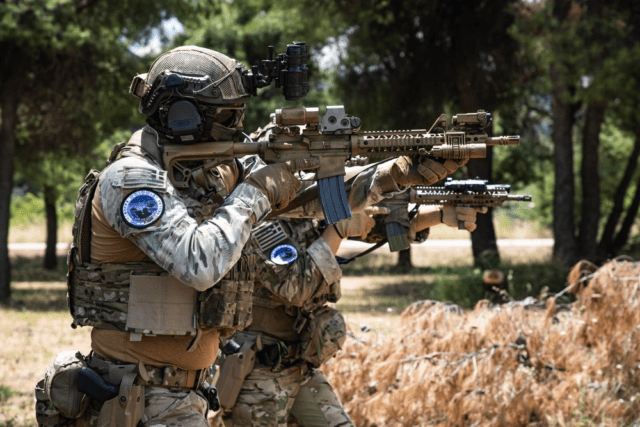
Geopolitical Report ISSN 2785-2598 Volume 26 Issue 3
Author: Giuliano Bifolchi
The Balkans is not immune to jihadist propaganda and terrorism financing and recruiting. Terrorism might affect the tricky regional security situation exacerbated by internal conflicts, economic crises and the current geopolitical changes due to the Ukraine conflict and the West – Russia confrontation.
According to open sources, from 2011 to 2016, around 1,000 people from the Balkans travelled to the Middle East to join mainly the Islamic State and Jabhat al Nusra (Hayat Tahrir al-Sham, HTS) or minor jihadist groups. Most of them are from Kosovo, Bosnia and Herzegovina, Macedonia, Albania, and Sandžak (Raška) between Serbia and Montenegro.
Since the fall of Raqqa and Mosul, Islamic State’s strongholds, the Balkans has experienced foreign fighters returning to their homeland. Indeed, these people who joined the terrorist activities in the Middle East could have spread jihadist propaganda in the region and supported local terrorist cells in organising and perpetrating violent attacks.
In July 2022, the European Union recently decided to start membership talks with Albania and North Macedonia. A few days ago, Brussels granted Bosnia and Herzegovina candidate status, a decisive step towards the country’s membership in the European Union. Kosovo is considered a potential candidate to join the EU, while Serbia and Montenegro are already candidate countries, although they must fulfil their duties to reach Brussels’ standard.
Considering the geopolitical and crucial role that the Balkans plays in the Eurasian strategic chessboard and the regional countries’ integration into the European Union, assessing potential risks and terrorist threats is fundamental to understanding the Balkan State’s possible impact it might have on EU security.
We met with the Serbian academic scholar and university professor Marija Djoric to discuss the current security situation in the Balkans and the jihadist threat to regional stability. Marija Doric earned her PhD in the violent extremism field and published over 90 research papers and five books. Currently employed at the Institute for Political Studies in Belgrade and a visiting professor at Charles University (Univerzita Karlova) in Prague. In addition, she is a consultant/expert for several international organisations (OSCE, UN, Council of Europe, RESOLVE…).
The Balkans play the interconnection role between the Middle East and Europe for terrorist organisations. What are the current security level and geopolitical risks of the region?
“Europe has mostly viewed the Balkans (sometimes with good reason and sometimes not) as cancerous tissue which can quickly spread to the rest of the continent. The Balkans are often metaphorically referred to (due to frequent internal conflicts) as a “powder keg”; however, it should be borne in mind that the fire in that “powder keg” was usually lit by someone else outside the Balkans. The region has always been an arena of various interests of the great powers because of its location at the world’s crossroads. It remains so today. Whoever controls the Balkans controls an important geopolitical point that can be used to calm or fuel tensions – it all depends on what is in the interests of the great powers.
When it comes to terrorism, its most intense forms in the Balkans in recent years have been ethno-separatist terrorism (through the activities of the Albanian so-called “Kosovo Liberation Army”, “Liberation Army of Bujanovac, Preševo and Medveđa”. “Albanian National Army”) whose main historical goal is the creation of the “Greater Albania”, which would destabilise the entire Balkan region.
Another current problem is religiously motivated terrorism. It is well known that some 1000 people from the Western Balkans joined some of the Islamist terrorist organisations in Syria (most of them joined DAESH). The territory of Kosovo and Metohija is known for the fact that the largest number of terrorists from Europe (relative to the total number of inhabitants) left for Syria and Iraq, precisely from that territory. Currently, a major security challenge is the return of foreign terrorist fighters (FTS) and their families from Syria and Iraq to the Balkans. Bosnia and Herzegovina, Kosovo, and Metohija are at a particularly high risk due to a large number of their inhabitants who joined terrorist organisations. Of course, as a post-conflict region (I mean here the wars of the 1990s), the Balkans is also threatened by the activities of right-wing extremism, which gains a new dimension with the migrant crisis and the war in Ukraine.”.
Do you believe that the current situation in Ukraine and the possibility for jihadist fighters and private contractors to move to the Ukrainian territory and fight among the ranks of the International Legion might influence the security situation in Europe, especially in the Balkans?
“The war in Ukraine has brought a number of security challenges on the global scale, so the Balkans will not be an exception. From the very beginning of the conflicts in Donbass in 2014, volunteers from the Balkans have been joining the Russian or Ukrainian side. In addition to those who left as the “dogs of war” (mercenaries), there were also some ideologically-driven individuals among the fighters from the Balkans.
The departure of the Balkan peoples to the Ukrainian front is still relevant today, but we should note a very important fact as a distinction from the rest of Europe. Namely, in all the countries of the so-called Western Balkans, laws have been enacted criminalising the departures to the foreign battlefields (mainly during 2015/16). The passing of these laws was mainly prompted by the war in Syria and the onset of the crisis in Ukraine in 2014. It is interesting that departures to foreign battlefields are still legal (or not explicitly prohibited) in many Western Europe countries, which, I am sure, will give a new dimension to the current conflict in Ukraine. Here, for example, Europe could learn from the Balkan states, which legally incriminate departures to foreign battlefields. I believe that the events in Ukraine will be a major generator for the strengthening of the extreme right in the Balkans, while, for the time being, we do not have the involvement of jihadist fighters from the region.”.

Considering Serbia, what is the Government’s strategy to contrast jihadist propaganda and terrorism recruiting?
“Serbia has a sound national strategy for combating terrorism, which is a document aligned with all international standards. The preparation of the new strategic document is currently underway. A total of 49 adult Serbian citizens (37 men and 12 women) left for Syria and Iraq.
The Prosecutor’s Office for Organized Crime filed an indictment against seven individuals, who were charged with the criminal offences of terrorist association, terrorism, recruitment and training for terrorist acts, public incitement of terrorist acts and financing of terrorism, all in connection with terrorist activities on the territory of Syria and Iraq. These individuals were sentenced to prison terms for a total of 69 years and six months.
On the other hand, in some countries of the region, prison sentences for the acts of terrorism are much more lenient; there are even individuals who were sentenced conditionally for an act of terrorism. My country (unfortunately) has a lot of experience in the fight against terrorist organisations involved in the secession of the Serbian Province of Kosovo and Metohija, which greatly contributes to addressing new forms of extremism and terrorism. Aside from solid legislation, Serbia is extensively involved in preventing violent extremism, collaborating with the countries from the region and with reputable international organisations.
Great emphasis is on working with young people, where the education system and civil society play an important part. Much is also being done in the rehabilitation and reintegration of returnees from foreign battlefields (especially mothers and children).”.
Do you believe that Serbia-Kosovo’s historical confrontation might affect regional security and create a fertile ground for terrorist activities?
“The so-called “Kosovo” is Europe’s black hole and the source of the most challenging security problems: corruption, organised crime, extremism, terrorism, trafficking in human beings, narcotics, weapons… At present, it is difficult to be a Serb and live in Kosovo and Metohija, especially knowing that all human rights have been violated, from freedom of movement, religious rights to the right to work and life.
As we speak, Serbs are struggling to survive in their centuries-old fatherland. Their struggle is not only a struggle for their own survival but for the survival of the Christian heritage in this part of Europe. There are about 1300 Christian churches and monasteries in Kosovo. In the last ten years alone, 150 churches, monasteries and other buildings have been damaged and desecrated, of which 61 have the status of cultural monuments, while 18 of them are of exceptional importance for Serbia. At the same time, more than 10,000 icons, religious artefacts and liturgical objects have been destroyed or looted and are presently in the illegal antiquities market. 5,261 tombstones were destroyed in 256 Serbian Orthodox cemeteries, while in more than 50 cemeteries, there is not a single undamaged tombstone.
Given these facts, it is difficult to talk about peace and stability in the Balkan region or even in Europe. The idea of the “Greater Albania”, which started with ripping away Kosovo and Metohija from Serbia, threatens to jeopardise the stability in the whole region (Montenegro, North Macedonia, Greece). I sincerely hope that the great powers will not allow that.
I see the opportunity for overcoming the conflict in the Balkans in the economic association of states which, by pursuing their common economic interests, will heal the old wounds and turn to a better future. If nothing else, we owe it to the new generations to remove the “Balkanisation” stigma from them.”.
